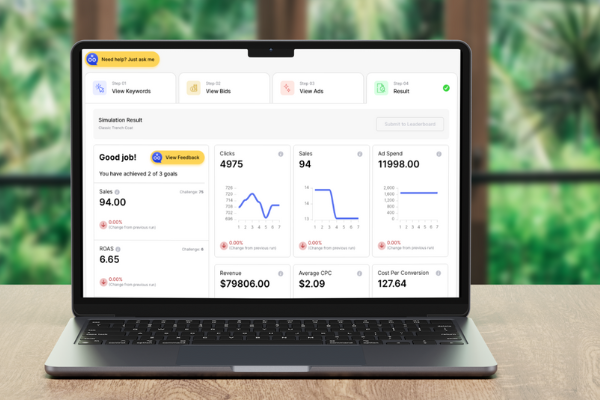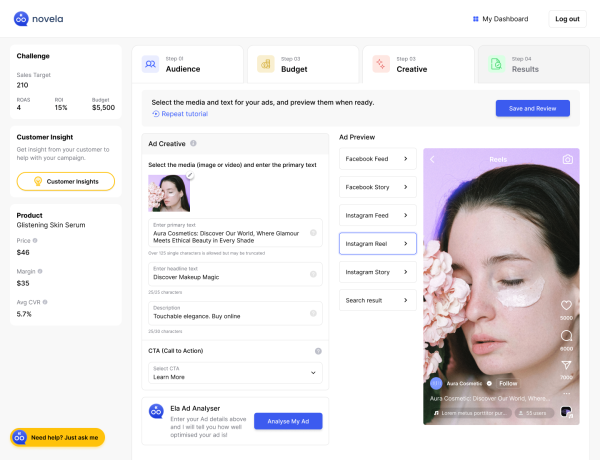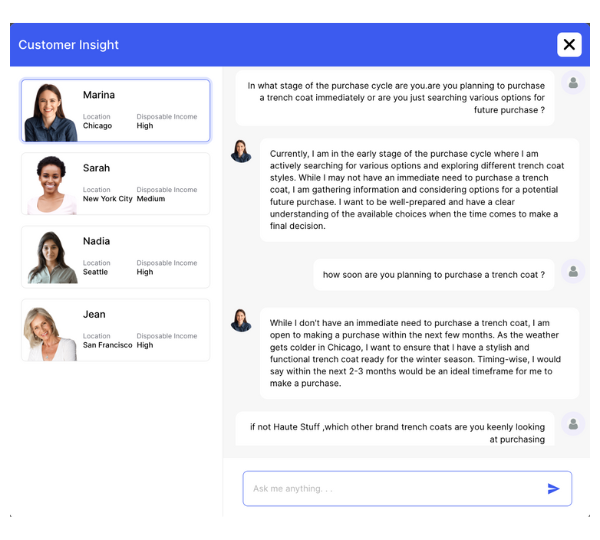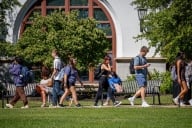You have /5 articles left.
Sign up for a free account or log in.

Novela provides real-time feedback for students, giving practical application to academic theory and helping them develop their digital marketing skills in the classroom.
Clark Boyd/Novela
Experiential learning provides students with hands-on training to build skills for the workforce, but some concepts can be difficult to demonstrate in the classroom.
A marketing and management professor at Hult International Business School developed a simulation gameplay to help learners grasp digital advertising and how theory applies in real-time.
The simulation, Novela, teaches learners to understand the core components of paid search marketing campaigns and how to analyze real-time data and learn strategies for evaluating campaign performance.
“It all began with a curiosity about how to bring active learning to the classroom without losing the theoretical underpinnings that provide the deeper substance,” says Clark Boyd, marketing and management faculty and Novela creator. “We really wanted to avoid having a superficial ‘game’ that looks slick, engages the class, but delivers negligible learning impact.”
The background: Across higher education, there can be a learning gap among students who are comfortable working in theory and the practical applications in their work.
In his first role at a digital marketing agency, Boyd feels it took him six months to feel comfortable in his work. “I didn’t enjoy it, I found it impossible to grasp what we were doing, and then I got, objectively speaking, good at it,” he says.
As an adjunct professor, he began to notice the learning gap from a different perspective, recognizing many career academics have never worked in digital marketing and don’t know how to prepare students for their work.
That pushed him to work alongside an ed tech group to create a digital marketing simulation that would both teach theory to students in class but also get them familiar with the practices they would need in their first roles.
How it works: Students play as a marketing manager at a fictional luxury company, Haute Stuff, loosely modeled after Burberry. They are tasked with improving sales for the company’s trench coat through search engine marketing with a total budget of $12,000.
Students learn to select target keywords in copy and set bids for their ads within search engines, before creating the ad and sending it off to market. The game provides students with real data from Google and third-party tools, built to closely mimic how Google functions.
“If you go to any marketing job after this, you will spend your days looking at these dashboards, your life will be these dashboards,” Boyd says.

Within Novela, students navigate identifying their audience, budget and creative materials before launching an ad.
Clark Boyd/Novela
Inside the game, students can interact with customer personas, powered by artificial intelligence, to conduct interactive focus groups and create marketing campaigns based on these insights. Students also get help from Ela, an AI-assistant who provides suggestions and advice.
After receiving the results, students can add their outcomes to a classroom leaderboard or play again and try to get different results.
The game takes students about 45 minutes to complete the first time, and Boyd says he will allot a full class period to helping students get started on the game. After that first round, many students will play again and again, most over 20 times, getting faster and better at navigating the dashboard.
The impact: After piloting the game in fall 2023 at Hult, “the results really took us aback,” Boyd says. “Students, who were not always fully engaged in normal classes—to be diplomatic—were engrossed in the simulation.”
Students were able to play the game at their own speed, with backend data revealing that while some engaged slowly and methodically, others sped through to get more feedback. One student played the game over 100 times, including late at night on the weekend, just to get to the top of the class leaderboard.
“Pleasingly, they were able to explain why their campaign hit the challenge objectives or fell short,” Boyd says. “This peer learning experience is something we had not fully anticipated, but we want to accentuate it more in the product in future.”
Boyd used Novela in one of his course sections and found students performed 40 percent better on relevant topics in the end-of-term quiz, compared to students who did not use the simulation, showing the power of active learning strategies.
Post-surveys found 100 percent of students would recommend playing Novela and 100 percent felt more confident about applying marketing principles after using the simulation.
The experience is not a replacement for real-life work experiences, but students have said they’re more confident in their workplaces as interns because they’re already familiar with jargon and metrics that are common in ad agencies.
Since using it in his own classroom, Boyd has helped Novela evolve into a commercial product. It has been used in face-to-face, online and hybrid courses at other institutions, including Imperial College in London and Columbia University.
In the future, Novela will expand to simulate Meta’s ad marketplace and include the creation of assets for fictional brands from a real ad agency. Future developments will also allow students to attempt B2B (brand-to-brand) marketing, in addition to the current B2C (brand-to-consumer) models.
DIY: For a professor looking to do something similar, Boyd offers some advice:
- Start small. Interactive activities don’t have to be as extensive or require as much preparation as Novela. Any kind of experiential activity can build student learning.
- Identify student interests. When creating the fictional brand, Boyd chose to make it a luxury brand, which was more intriguing to students compared to other case studies he had used in class.
- Collect data. Each student has their own journey and progression over time, so finding tools that increase visibility into how students engage with the simulation can be illuminating.
- Talk with colleagues. Whether it’s Novela or another interactive activity, Boyd recommends engaging with peers who are looking to solve similar problems.
If your student success program has a unique feature or twist, we’d like to know about it. Click here to submit.









